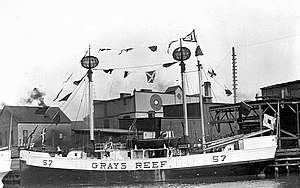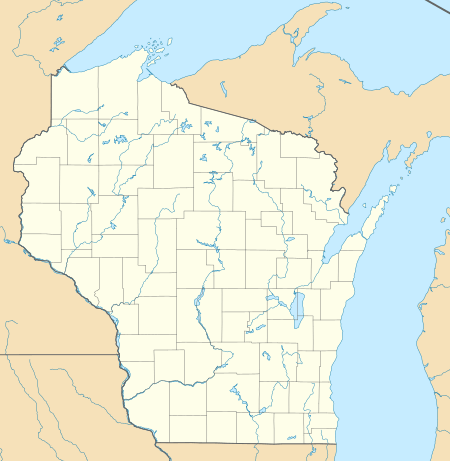Light Vessel No.57
Light Vessel No.57 (also known as Lightship No.57 or LV57) was an American lightvessel that was built in 1891, and served on the Great Lakes, west of the Straits of Mackinac; (the reef is now the site of the Grays Reef Light) from her construction, to her retirement in 1924. She was wrecked by a storm a couple years later.[2] On December 16, 1996 the remains of Light Vessel No.57 were listed on the National Register of Historic Places.[1]
 Light Vessel No.57 at Manitowoc, Wisconsin | |
| History | |
|---|---|
| Name: | Light Vessel No.57 |
| Builder: | Craig Shipbuilding Company |
| Launched: | 1891 |
| In service: | 1891 |
| Out of service: | 1924 |
| General characteristics | |
| Type: | Lightvessel |
| Tonnage: |
|
| Length: | 90 feet (27 m) |
| Beam: | 20 feet (6.1 m) |
| Depth: | 8 feet (2.4 m) |
LIGHT VESSEL No.57 (Shipwreck) | |
  | |
| Location | 600 feet south of South Shore Park's northern tip right along the shore |
| Nearest city | Manitowoc, Wisconsin |
| Coordinates | 43.001533°N 87.8855°W |
| Built | 1891 |
| Architect | Craig shipbuilding Company |
| Architectural style | Lightvessel |
| NRHP reference No. | 91001823[1] |
| Added to NRHP | December 16, 1996 |
History
Light Vessel No.57 was built in 1891, in Toledo, Ohio by the Craig Shipbuilding Company, at a cost of $14.225. She was one of three federal lightvessels designed for use during the navigational season as an experiment to avoid the construction of a much more expensive permanent lighthouse. Her wooden hull was 90 feet (27 m) long, and was built of white oak planks, that were fastened together with 5.8 inch iron spikes.[3] Her beam was 20 feet (6.1 m) wide, and her hull was 9 feet (2.7 m) deep. She also had a gross tonnage of 130 tons, and a net tonnage of 101 tons.[4][5] She had two masts, and a cluster three oil burning lens lanterns that were hoisted onto each masthead. She had a top speed of eight knots.[3]
From 1891 to 1923, Light Vessel No.57 was stationed at Grey's Reef, a ridge of rock 18 miles west of the Mackinac Bridge in northeastern Lake Michigan. Due to the increased ship traffic in the area, it was decided that she would be moved to Gray's Reef to make the area safer.[3]
Later history
Light Vessel No.57 was retired in 1923. In 1924 she was sold to the South Shore Yacht Club, Milwaukee, Wisconsin[4], and was no longer in the federal government's records. Later, she was condemned and dismantled and finally brought to Milwaukee, Wisconsin. She lay in Norwegian Alley for several years. In 1928, Light Vessel No.57 was taken to the South Shore Beach, Milwaukee, Wisconsin, and was used as a clubhouse until she was wrecked by a storm several years later.[6]
A November 28, 1926 issue of the Milwaukee Journal Sentinel reported that Light Vessel No.57 was bought by a junk dealer who "removed the pig iron and sold it with all else removable and salable."[6]
Wreck of Light Vessel No.57
The remains of Light Vessel No.57 were discovered by divers along the shore, about 600 feet (180 m) south off the tip of South Shore Park. One of the divers reported that while most of the ship was buried under silt in 6 feet (1.8 m) to 12 feet (3.7 m) of water, some parts of her hull are poking through the lake floor.[7]
Legacy
In November 2018, the Sprecher Brewery released a beer named after Light Vessel No.57.[8]
References
- "LIGHT VESSEL No. 57 (Shipwreck)". National Park Service. Retrieved January 13, 2019.
- "Lightship 57 (1891)". Wisconsin Shipwrecks. Retrieved January 13, 2019.
- "Service History". Wisconsin Shipwrecks. Retrieved January 13, 2019.
- "LIGHTSHIP NO. 057". Bowling Green State University. Retrieved January 13, 2019.
- "U.S. LIGHTSHIP NO. 57 (1891, Propeller)". Alpena County George N. Fletcher Public Library. Retrieved January 13, 2019.
- "Final Voyage". Wisconsin Shipwrecks. Retrieved January 13, 2019.
- "Today". Wisconsin Shipwrecks. Retrieved January 13, 2019.
- "Sprecher Brewery to Release Lightship 57 Session IPA". Brewbound. Retrieved January 13, 2019.